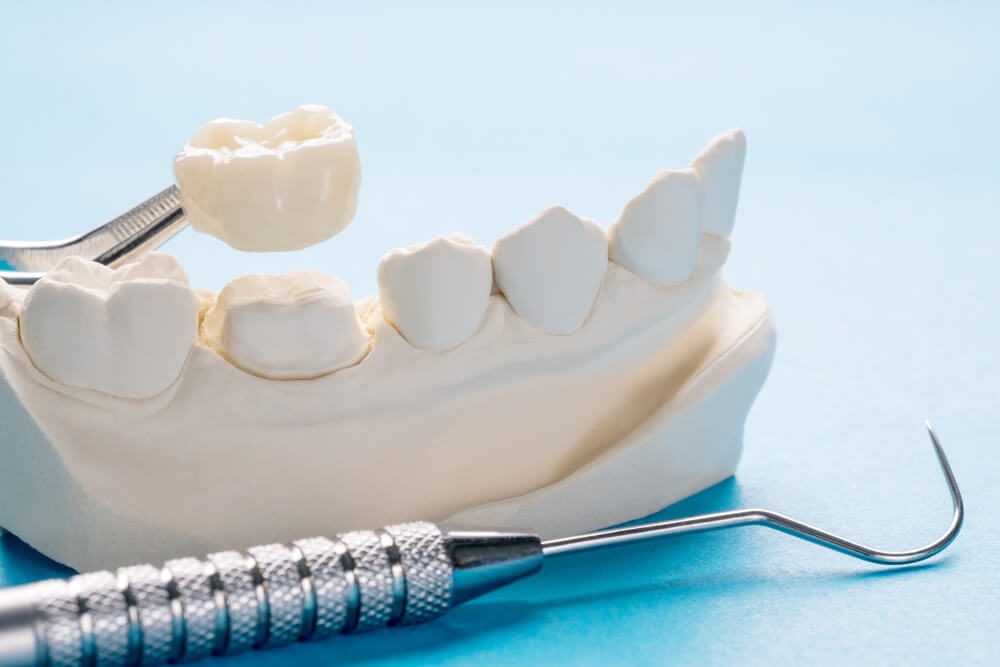Dental Crown Benefits and Risks

If you’ve been told you need dental crowns, it’s natural to have mixed feelings. On one hand, you’re probably looking for relief from a damaged or vulnerable tooth.
On the other, you’re wondering about the long-term effects, what the procedure entails, and whether it’s the right solution for you. That hesitation is valid.
Dental crowns offer remarkable benefits, but like any dental procedure, they come with a few risks that are worth understanding before you commit.
Why People Get Dental Crowns
Crowns for teeth are frequently recommended when a tooth is too damaged for a simple dental filling but badly damaged that it must be removed. You may need one after a root canal, a large filling, or a crack that compromises the tooth’s strength.
Crowns are also commonly used to cover discoloured or misshapen teeth or to complete a dental implant.
They’re designed to fit snugly over your natural tooth, restoring both appearance and function. The idea is simple—protect what’s left of your tooth while giving it a second chance to function normally.
The Benefits: Why Dental Crowns Are a Game-Changer
1. Strength and Protection
One of the most valuable benefits is how crowns reinforce weakened teeth. If you’ve had repeated dental work on the same tooth or are recovering from a fracture, a crown essentially wraps your tooth in custom armour.
That means less risk of further damage and a longer lifespan for your natural tooth.
2. Pain Relief
If you’re experiencing discomfort from a cracked tooth or biting sensitivity due to enamel wear, a dental crown can reduce or eliminate that pain. Once the crown is in place, it provides a solid barrier between your tooth and external triggers, such as hot, cold, or pressure.
3. Improved Function
Chewing on one side of your mouth to avoid a sensitive or broken tooth isn’t just inconvenient—it can affect your jaw over time. Crowns let you bite, chew, and speak with more confidence and comfort, restoring balance to your mouth’s functionality.
4. Aesthetic Value
Modern crowns are remarkably lifelike, particularly those composed of porcelain or ceramic. They can be matched to the colour of your natural teeth so well that it’s hard to tell if you’ve had dental work done at all.
If you’ve felt self-conscious about a visible filling or broken tooth, a crown can offer a subtle yet powerful boost to your smile.
5. Long-Term Investment
Crowns are durable. When given proper care, they can live for ten to fifteen years and occasionally much longer. While they’re not indestructible, they’re a worthwhile long-term solution that can help you avoid more complex (and costly) dental procedures down the line.
The Risks: What to Be Aware Of
While dental crowns are safe and routine, it’s also essential to understand what could go wrong—or at least not go perfectly.
1. Tooth Sensitivity
After a crown is placed, it’s not uncommon to experience some sensitivity, especially to temperature changes. This usually settles over time.
But in some cases, if the crown isn’t properly adjusted, you might feel discomfort when biting. If that happens, don’t ignore it—your dentist can easily correct the fit.
2. Potential for Decay
Yes, a crown covers the tooth—but the area at the base of the crown, near the gumline, can still be vulnerable. If bacteria collect there, you may experience decay under the crown, which could lead to further complications.
Maintaining excellent oral hygiene is key here. One needs to have regular brushing, flossing, and dental visits.
3. Gum Irritation or Recession
Sometimes, crowns can cause inflammation in the gums, especially if they don’t fit perfectly or if your gums are already sensitive. Over time, gum recession can expose the edge of the crown or the tooth underneath, which might affect both function and appearance.
4. Crown Loosening or Falling Off
Crowns are cemented in place, but that cement can break down over time. Once the fit tends to be loose or falls off, the crown should be re-glued or switched.
Again, this is typically easy to fix—but it does mean a trip back to the dentist.
5. Allergic Reaction or Metal Sensitivity
It is also possible that some patients may have an allergic reaction to the material applied to certain types of crowns, particularly those that contain metal. If you have a history of allergies or metal sensitivity, it’s worth discussing this in detail with your dentist before proceeding.
Balancing the Pros and Cons
Getting a dental crown is a personal choice that ideally combines your dentist’s recommendation with your comfort level and expectations. While crowns have their drawbacks, they’re often outweighed by the benefits—especially when you’re looking to save a compromised tooth and avoid further issues.
Still, it’s important not to rush the decision. If you’re unsure, ask questions.
Find out what materials are being used, how long the crown is expected to last, and what your responsibilities are in terms of care. Being informed puts the power back in your hands.

Caring for Your Dental Crown
After placing your crown, daily activities play a significant role in its success and the maintenance of your crown.
- Brush twice daily with fluoride toothpaste.
- Floss around the crown at the bottom.
- Do not chew hard things, such as ice or pens, particularly with porcelain crowns.
- Get regular dental check-ups to detect the problems at an early age.
Remember, a dental crown isn’t a free pass to ignore your tooth—it’s a second chance to keep it healthy and functional for years to come.
Dental Crowns in Yeronga
If you’re considering dental crowns and want to feel confident in your next steps, now is a great time to discuss your options with your Yeronga dentist. A good conversation can clarify your doubts, outline your options, and guide you toward a treatment plan that genuinely works for you.
Take the first step today. Book your consultation at Ria Family Dental and find out if dental crowns are the solution your smile needs.
Call your Yeronga dentist at 0451 359 356, or you can visit us at 451 Fairfield Rd in Yeronga.

